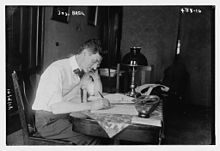Joseph Carl Breil
Joseph Carl Breil | |
|---|---|
 Breil in 1918 | |
| Born | June 29, 1870 Pittsburgh, Pennsylvania, U.S. |
| Died | January 23, 1926 (aged 55) Los Angeles, California, U.S. |
| Resting place | Hollywood Forever Cemetery |
| Alma mater | |
| Occupation | Composer |
| Spouse | Alta Gelvin |
Joseph Carl Breil (29 June 1870 – 23 January 1926) was an American
stage director, composer and conductor. He was one of the earliest American composers to compose specific music for motion pictures. His first film was Les amours de la reine Élisabeth (1912) starring Sarah Bernhardt. He later composed and arranged scores for several other early motion pictures, including such epics as D. W. Griffith's The Birth of a Nation (1915) and Intolerance (1916), as well as scoring the preview version of The Phantom of the Opera (1925), a score that is now lost.[citation needed] His love theme for "Birth of a Nation", titled "The Perfect Song", was published by Chappell & Co. in an arrangement for voice and keyboard. It was later used as the theme for the radio show Amos 'n' Andy.[1]
Life
Joseph was the first of four children born to Joseph and Margaret Breil of Pittsburgh. (Joseph Sr., a lawyer, was an immigrant from Prussia and his wife was born in Pennsylvania.)University of Leipzig to study law. While in Leipzig he began to study music composition and singing at the Leipzig Conservatory. These were followed by singing lessons in Milan and Philadelphia (with Giuseppe del Puente).[1]
He toured as principal tenor of the
Victor Records in 1910), for Edward Locke's three-act play, The Climax, which premiered on 12 April 1909, at Joseph W. Weber's Music Hall, New York City. After this he spent the next decade composing mostly film music. It is his work in this medium that his legacy rests on. He also composed the one-act lyric opera, The Legend, one of the first such works by an American. The Legend, on which Breil had begun work in 1907, premièred at the Metropolitan Opera on 12 March 1919, to less-than-favorable reviews. He died of heart disease on 23 January 1926, following a nervous breakdown suffered on account of the failure of his final opera, Der Asra.[1] He is interred at Hollywood Forever Cemetery.[4]
Personal life
Breil married Alta (Dot) Gelvin.[citation needed]
Operas
- Orlando of Milan (c. 1888)
- Love Laughs at Locksmiths (27 October 1910, Portland, Maine)
- Prof. Tattle (1913)
- The Seventh Chord (1913)
- The Legend (12 March 1919, Metropolitan Opera)
- Der Asra (24 November 1925, Los Angeles Opera)
References and notes
- ^ a b c M. Marks: Music and the Silent Film (New York, 1997)
- ^ 1880 United States Federal Census, accessed 20 November 2012 (available through subscription).
- ^ "Alma Mater". Duquesne University. Archived from the original on 2007-07-02. Retrieved 2010-07-18.
- ^ "Joseph Carl Breil (1870 - 1926) - Find A Grave Memorial". findagrave.com. Retrieved 15 March 2015.
External links
- Works by or about Joseph Carl Breil at Internet Archive
- Joseph Carl Breil at IMDb
- Joseph Carl Breil (SoundtrackNet)
- Joseph Carl Breil (US Opera)
- Opera Glass
- Joseph Carl Breil (EDVR)
Streaming audio
- Song of the Soul at the Library of Congress.
Sheet music
- The Perfect Song at the Sheet Music Consortium.
- Song of the Soul at the Sheet Music Consortium. Select view sheet music.
